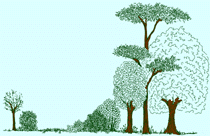 |
Global Eco-systems and the effects of farming | |
|
Farming has been on my mind a lot recently, primarily because of its dominance of land use in the UK. The recent Urban White Paper had two very telling graphics depicting centres of population density over 10,000 and the proportions of urban and rural land occupied by different proportions of the population. Both of these give the lie to the propaganda that the UK is an over crowded island. What actually is true is an enforced urban density created by the shift of rural populations to urban centres during the 18 and 19th century and its maintenance by the rise of large area land ownership through enclosures and through the clearances in Scotland. While rural depopulation may have had a link through the necessity of migrating to urban employment, the reduction in the number of hamlets (over 800) suggested a widespread de-skilling and a disconnection between the populace and primary land use. Now, planning policies maintain the division but with the force of law. Nothing changes because the sacred cow of land ownership and land use is never challenged or rationally discussed, and few people ever attempt to identify the reality (Colin Tudge has made the odd attempt, George Monbiot has lost focus). And it is hopeless to think that the organic farming movement will do anything since they are just as entrenched in maintaining the status quo of inequitable land ownership and use as anyone else. (Patronage, hereditary principle etc..) Somehow, UK landuse has to come up for discussion. Maybe what has to happen is put the UK into a global context so that we can be seen for what we are. I don't know whether you saw it, but the American Association for the Advancement of Science has produced a report that provides an Atlas of Population and Environment based on images from high resolution satellites. The Atlas shows areas of human transformation of land as well as natural landscapes of forest, savannah/grass, wetlands, shrubland, dessert and snow/ice. The UK shows virtually no area of any size that has not been affected, or in fact has any of the latter (Oliver Rackham has chronicled our complete loss of wildwood). At least the big, bad USA shows 50% untransformed and Australia plus Canada probably 90%. (This was in the Independent this Saturday). Another study provides more information: Pilot Analysis of Global Ecosystems: AGROECOSYSTEMS A Joint Study by World Resources Institute and International Food Policy Research Institute (www.ifpri.com) The report is an analysis of the extent of agricultural land use and assesses the status of agroecosystems on a global basis. The report maps global agriculture and the authors suggest it can show the ways to better understand and monitor changes in the capacity of systems to provide sustainable goods and services. Its a good overview and here is what it concludes on CO2: Carbon Storage The world's plants and soil organisms absorb carbon dioxide (CO2 ) during photosynthesis and store it in their tissues, which helps to slow the accumulation of CO2 in the atmosphere and mitigate climate change. Land use change that has increased production of food and other commodities has reduced the net capacity of ecosystems to sequester and store carbon. Carbon-rich grasslands and forests in the temperate zone have been extensively converted to cropland and pasture, which store less carbon per unit area of land. Deforestation is itself a significant source of carbon emissions, because carbon stored in plant tissue is released by burning and accelerated de-composition. Forests currently store about 40 percent of all the carbon held in terrestrial ecosystems. Forests in the northern hemisphere are slowly increasing their storage capacity as they regrow after historic clearance. This gain, however, is more than offset by deforestation in the tropics. Land use change accounts for about 20 percent of anthropogenic carbon emissions to the atmosphere. Globally, forests today are a net source of carbon. This could of course be talking about the UK, even though it is a global perspective! The question is whether Permaculture - given the chance - can provide better land use solutions. Mark Fisher, 19 February 2001 www.self-willed-land.org.uk mark.fisher@self-willed-land.org.uk |